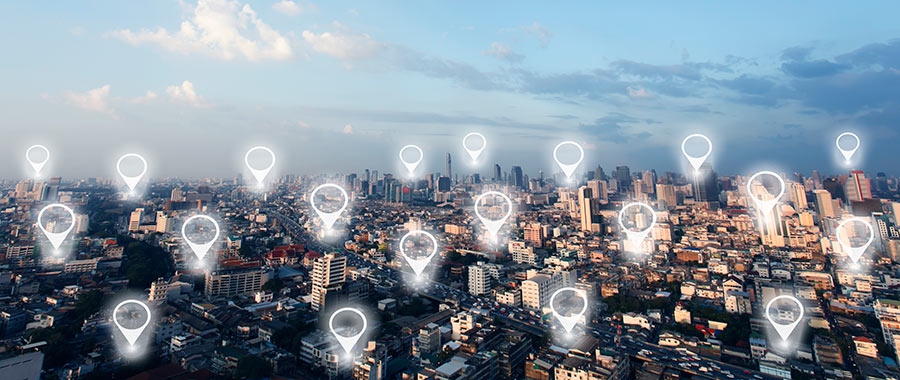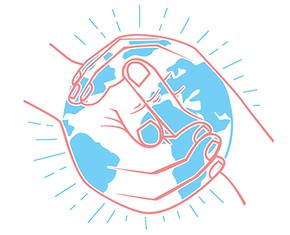The views expressed in our content reflect individual perspectives and do not represent the authoritative views of the Baha'i Faith.
The internet offers knowledge to millions of people all around the globe, but it’s also full of controversy and hate—so is it possible to create a positive community on the Web?
In this age of swiftly-advancing technology, our lives take shape based on our interactions with others—and with access to millions of people’s opinions over the internet, the Web highlights all of the world’s social problems. Many people seem to have a different attitude when encountering people on Facebook than they would if they saw them face to face. Slander and backbiting, when it’s about a celebrity on Twitter, suddenly seems okay because it isn’t about someone we really know.
But is there really such a big difference between our interactions in real life and those on the Web?
The Baha’i teachings say “Let your heart burn with loving kindness for all who may cross your path.” – Abdu’l-Baha, Paris Talks, p. 16.
Those words imply a great change in the way we approach people, both strangers and friends. How many people do we walk by on the street without paying attention? Are we conscious about loving others when we’re standing in front of a cashier, or walking by a janitor? Do we really love everyone?
With that thought in mind, what about the virtual life we all have on the internet? How many people do we scroll past on social media, and how many opinions do we read or listen to on online platforms? Are we supposed to let our heart burn with loving kindness for all of those people, too?
It’s very difficult to avoid the atmosphere of general hostility that invades some parts of the internet. On the web, it has become normal to speak harshly when giving our opinions; to use controversy as a means of getting people to listen. We’re all saddened by the horrible news we read, and the hateful rhetoric we encounter in many comment sections.
It seems that the internet presents a much more difficult space to build a positive, spiritual environment—not because it isn’t doable, but because we’re not used to applying the same spiritual framework through our screens that we do when we encounter each other face-to-face.
The internet exists for us to share ideas, and it has become a necessity in almost every area of life. The idea is not to curb its usage, but to expand the way we view it. How can we be spiritually responsible while using social media? Can we be a source of good over the internet?
Abdu’l-Baha said:
Love the creatures for the sake of God and not for themselves. You will never become angry or impatient if you love them for the sake of God. Humanity is not perfect. There are imperfections in every human being, and you will always become unhappy if you look toward the people themselves. But if you look toward God, you will love them and be kind to them, for the world of God is the world of perfection and complete mercy. Therefore, do not look at the shortcomings of anybody; see with the sight of forgiveness. The imperfect eye beholds imperfections. The eye that covers faults looks toward the Creator of souls. He created them, trains and provides for them, endows them with capacity and life, sight and hearing; therefore, they are the signs of His grandeur. You must love and be kind to everybody, care for the poor, protect the weak, heal the sick, teach and educate the ignorant. – Abdu’l-Baha, The Promulgation of Universal Peace, p. 93.
When it comes to online interactions, try to keep this quote in mind. Anger and impatience definitely infest some comment sections, and the imperfections of humanity are often on display in the news articles or listicles we read. But the solution is not to fight the trolls, or loudly proclaim our annoyance at a certain topic. Abdu’l-Baha speaks of seeing potential in everything—in finding a way to love everyone, for the sake of God.
His advice to “educate the ignorant” is also interesting. Many people purposefully address hostile comments with the intention of changing minds. This is not necessarily wrong, but it’s important to examine our attitudes. Are we doing this out of love for others, or are we doing it out of a sense of superiority? Do we want to “fix” them, or to share our ideas like we would with a friend we disagree with? Is it done in a spirit of kindness?
Beyond the comments and the flames, what feeling does a person get when visiting our timeline, or reading our tweets—or even seeing the memes we post? Are those feelings elicited by the uplifting content we share? That’s not to say that they should be serious or meditative all the time—our content can be funny, too. But does it reflect the perfections of humanity, rather than the imperfections?
Could we find a way to convey the love we have to all those who cross our social media paths?
Each one of us has to answer these questions ourselves. After all, humanity has only had the internet for a relatively short time, and we’re all still learning.
















Comments
Sign in or create an account
Continue with Googleor